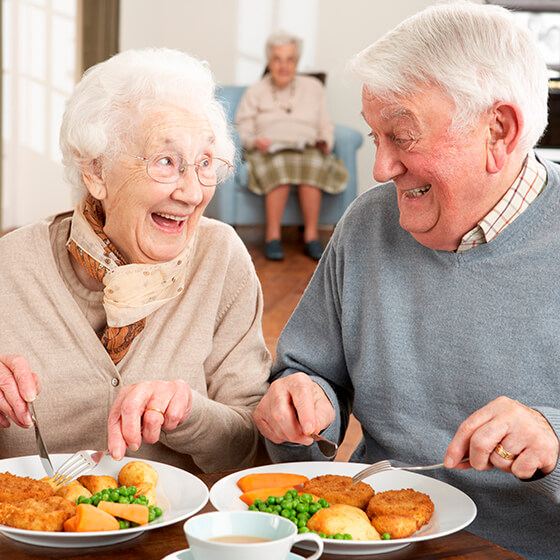Last week we discussed the possible medical and non-medical causes of appetite loss in the elderly. It is critical to address any medical conditions by working with your family doctor, or specialist and creating a plan of care that specifically addresses your elderly loved ones individual medical needs. A personal care worker can be of great assistance in regards to keeping medicine on an organized routine and supporting physical therapy regimens.
Aside from doctor-prescribed health routines, there are a few techniques you can experiment with to see if there is another way to increase appetite in your elderly loved one. Ensure that you are documenting their appetite and eating status to keep track of which food they enjoy, which they don’t like and if anything is upsetting their digestive system or bowels. Be mindful of what they are eating, and also when they have the strongest appetite. This can help inform you in the future with the meal schedule as you can schedule larger meals when they are most hungry. Keeping track and documenting evidence takes the guesswork out of managing your elderly loved one’s appetite.
Techniques for Healthy Eating Habits
Keep a Routine
By eating at regular intervals and at specific times of the day, you prepare the body and mind of your loved one for the meal. Their body will get on the routine and be ready to eat and digest the food more efficiently. Do not wait until they are hungry as they may lose the ability to feel their hunger and appetite as it declines with age. Feed them regularly and document which times of the day are their preference for eating.
Make it Easy
Some seniors may not have the energy to make their meals. As well, they may not feel conformable digesting a large meal and would prefer smaller snacks more often. Make accessing snacks as easy as you can to make it convenient for them to eat more. Keep a variety of healthy, tasty and easy-to-eat snacks available at all times to encourage their grazing behavior.
Suggestions:
- Dairy snacks: cottage cheese, yogurt, cheese and milk
- Fruit: either easy-to-eat like blueberries or pre-cut them into containers
- Nuts: Peanut butter and crackers or containers with their favorite nuts
- Veggies: Small baby carrots or pre-cut veggies and hummus.
Blended Food
Eating a meal can be draining and frustrating for seniors with low energy, or uncomfortable dentition conditions. So making smoothies may be an excellent way of increasing caloric and nutrient intake without increasing the effort the senior needs to put in. As well, blending food can make it easier for sensitive stomachs to digest.
Suggestions:
- Healthy Smoothies: use bananas, peanut butter, yogurt, fruit and veggies such as spinach and carrots
- Soup: use pureed meats, veggies and other high-fat ingredients such as dairy and oil
- Favorite Hot Drink: apple cider, hot chocolate, lattes
- Favorite Cold Drink: iced caps, Frappuccino, milkshakes
Utensil Frustration
Some seniors find it difficult and aggravating to use utensils. This can cause them to become meal avoidant and insecure about eating in front of others. If your senior has this problem, then bypassing utensils for most meals can build confidence and security in their eating routine.
Suggestions:
- Cut veggies: baby carrots, broccoli, bell pepper, cucumber slices, etc.
- Cut fruit: apple slices, orange pieces, berries, banana
- Chicken nuggets
- Fish Sticks
- Meatballs.
These are some suggestions for solutions for loss of appetite. You and your senior are your best advocates, so ensure that you are tailoring your approach to their dietary preference. Each family and culture have their favorite foods and eating styles that may allow for ease of eating and sense of community. Seniors often know what they enjoy and with some creative thinking, you can take their long-time favorites and make them accessible. Ensure you are acting within your doctor`s recommendations and work closely with them to guarantee that your loved one is receiving the necessary dietary requirements.
A personal care worker can be a great ally in this as they will have the knowledge and skills to appropriately document their needs and care practices. Teamwork is valuable when finding solutions so work together with your senior, their doctor and a personal care worker to find an eating routine that works.
We also recommend you check these related posts in our Home Care Services blog:

